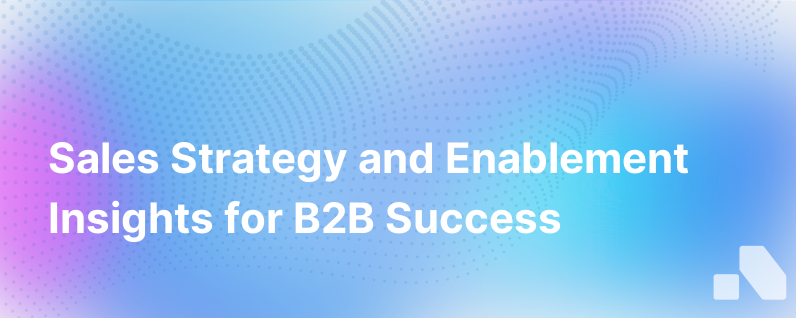
In today’s hyper-competitive business environment, having a robust B2B sales strategy complemented by powerful sales enablement can be the defining factors between thriving organisations and those struggling to meet their revenue goals. As companies navigate the complexities of the sales landscape, it is imperative to adopt methods and deploy tools that can steer sales teams toward sustained success.
The Anatomy of a Successful B2B Sales Strategy
A comprehensive sales strategy in the B2B realm transcends the mere action of selling. It serves as a holistic roadmap, guiding the sales team through meticulously crafted stages—from prospecting to closing deals—while always centering on solving customer problems and adding value at every touchpoint.
One of the bedrocks of this strategy involves a keen understanding of the target market. Identifying the ideal customer profile (ICP) is paramount. Companies must delve into market research, utilizing data analytics to paint detailed portraits of their prospective buyers, including industry-specific pain points, preferences, and decision-making processes.
This depth of knowledge facilitates the implementation of account-based marketing (ABM) strategies, allowing businesses to craft personalized, high-touch campaigns focused on select accounts that hold the greatest potential for revenue.
Moreover, the modern B2B sales strategy acknowledges the necessity of collaboration between sales and marketing teams. It thrives on shared objectives, transparent communication, and combined efforts to nurture leads and edge them closer to conversion.
Sales Enablement: The Force Multiplier
Sales enablement and strategic selling are almost synonymous in a well-oiled B2B sales operation. Sales enablement is the strategic ongoing process that equips the sales force with tools, content, and information to sell more effectively.
The enablement process disseminates strategic narrative and content throughout the sales team, ensuring coherence and a unified voice when engaging prospects. An enablement platform might provide on-demand access to case studies, product data sheets, or competitive intelligence—each a vital piece of ammunition in the seller’s arsenal aimed at edging out competition.
Training and development also fall under the umbrella of sales enablement. Continuous learning modules, workshop sessions, and coaching are designed to enhance sales techniques and product knowledge. The emphasis is on fostering consultative selling skills so that sales representatives become trusted advisors rather than mere vendors to their clients.
CRM and Sales Technologies: Enabling Data-Driven Decisions
At the heart of any modern B2B sales strategy lies the customer relationship management (CRM) system. It is not just a database but the nexus where customer interactions, sales pipelines, and performance data converge. Advanced CRM platforms now leverage artificial intelligence to deliver actionable insights, automate mundane tasks, and personalise customer interactions.
Furthermore, sales technologies, such as AI-driven analytics tools and sales automation software, have become integral to the strategic apparatus. They allow for streamlined operations, better forecasting, and the early identification of trends and opportunities that can be the difference between hitting and missing targets.
Content Marketing: Aligning Sales with Educational Value
No modern sales strategy is replete without a content marketing component. Content marketing utilizes various formats—blogs, whitepapers, webinars, and videos—to educate prospects and provide value well before a sales discussion is initiated.
For sales teams, content is king not just in attracting leads but in nurturing them through the sales funnel. With an arsenal of educational and consultative content at their disposal, sales representatives can better position their offerings, differentiate their solutions, and address customer challenges effectively.
Metrics: The Compass for Sales Strategy and Enablement
The data-driven approach doesn’t end with using CRM for customer management; it extends to measure the effectiveness of sales strategies and enablement initiatives. Key performance indicators (KPIs) go beyond the surface-level metrics like quarterly sales figures. They delve into conversion rates, average deal sizes, sales cycle lengths, and customer lifetime values—each providing a piece of the puzzle on where improvements are needed.
In keeping with the ethos of continuous improvement, the most successful B2B players iterate on their strategies, remaining agile to adapt to market changes, evolving buyer behaviors, and competitive dynamics.
In Summary
The confluence of a well-thought-out B2B sales strategy and robust sales enablement practices can drastically improve sales effectiveness, ultimately driving revenue growth. By intertwining deep market understanding with customer-centric selling, leveraging cutting-edge CRM and sales technologies, fostering continuous learning, and adhering to a metrics-driven approach, businesses can remain competitive in a dynamic B2B landscape.
Note: For B2B sales teams looking for a transformative edge, Aomni offers an AI platform that elevates account research, competitive insights, and personalized sales content creation—streamlining the path to strategic selling with real-time, zero-effort solutions.
Sources:
- B2B Sales Enablement: Your Guide to Creating a Robust Strategy
- B2B Sales Enablement: Your Guide to a Winning Strategy
- The Only Guide You’ll Ever Need for B2B Sales Enablement
- B2B CRM Strategy — Top 5 Benefits Of Using A CRM For B2B Sales
- Content Marketing: How to Make it a Key to Sales Enablement
- Beyond the brochure: the role of B2B content marketing in sales enablement
- 11 Sales Metrics Every B2B Organization Should Be Tracking
- 5 Trends Shaping B2B Sales in 2023